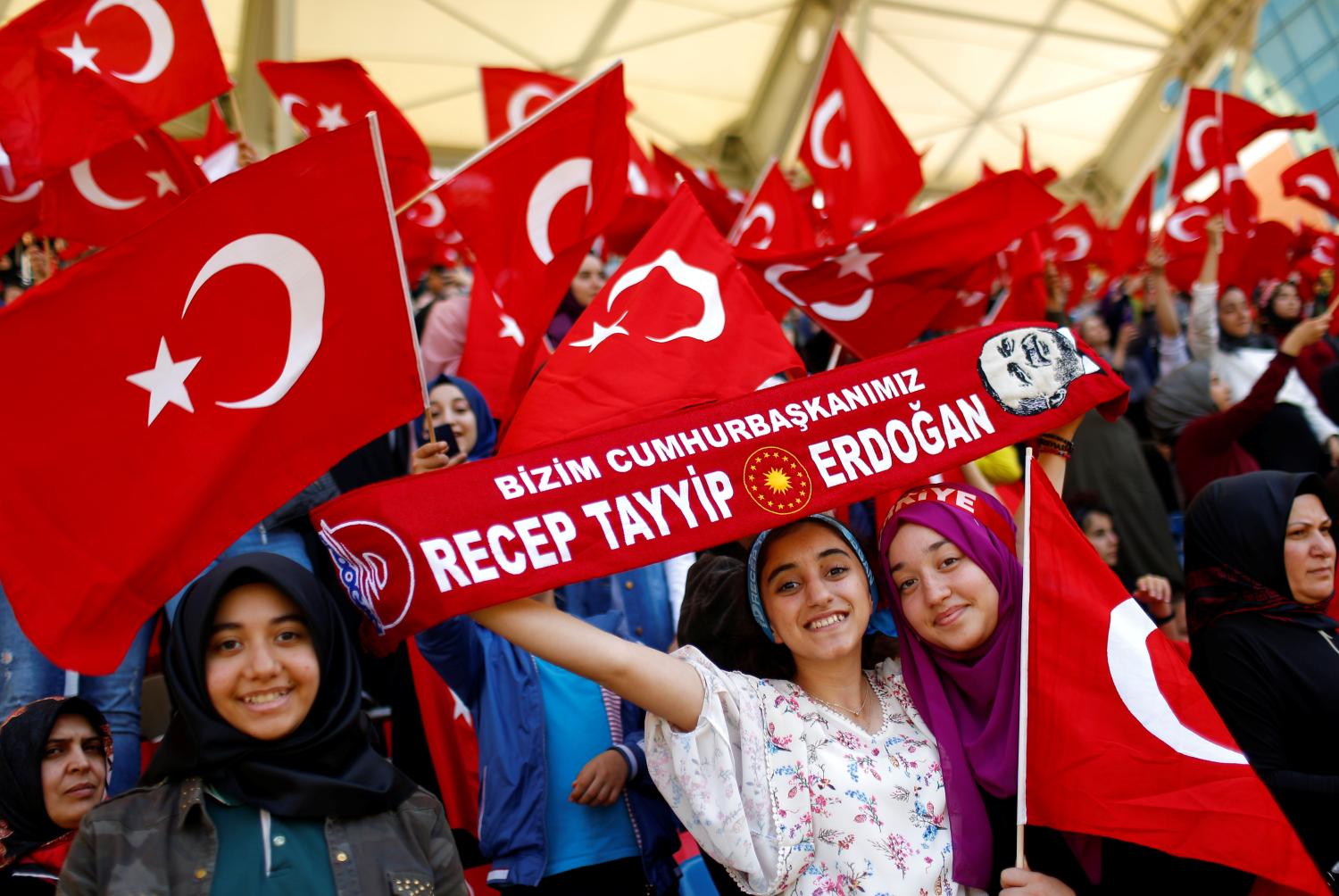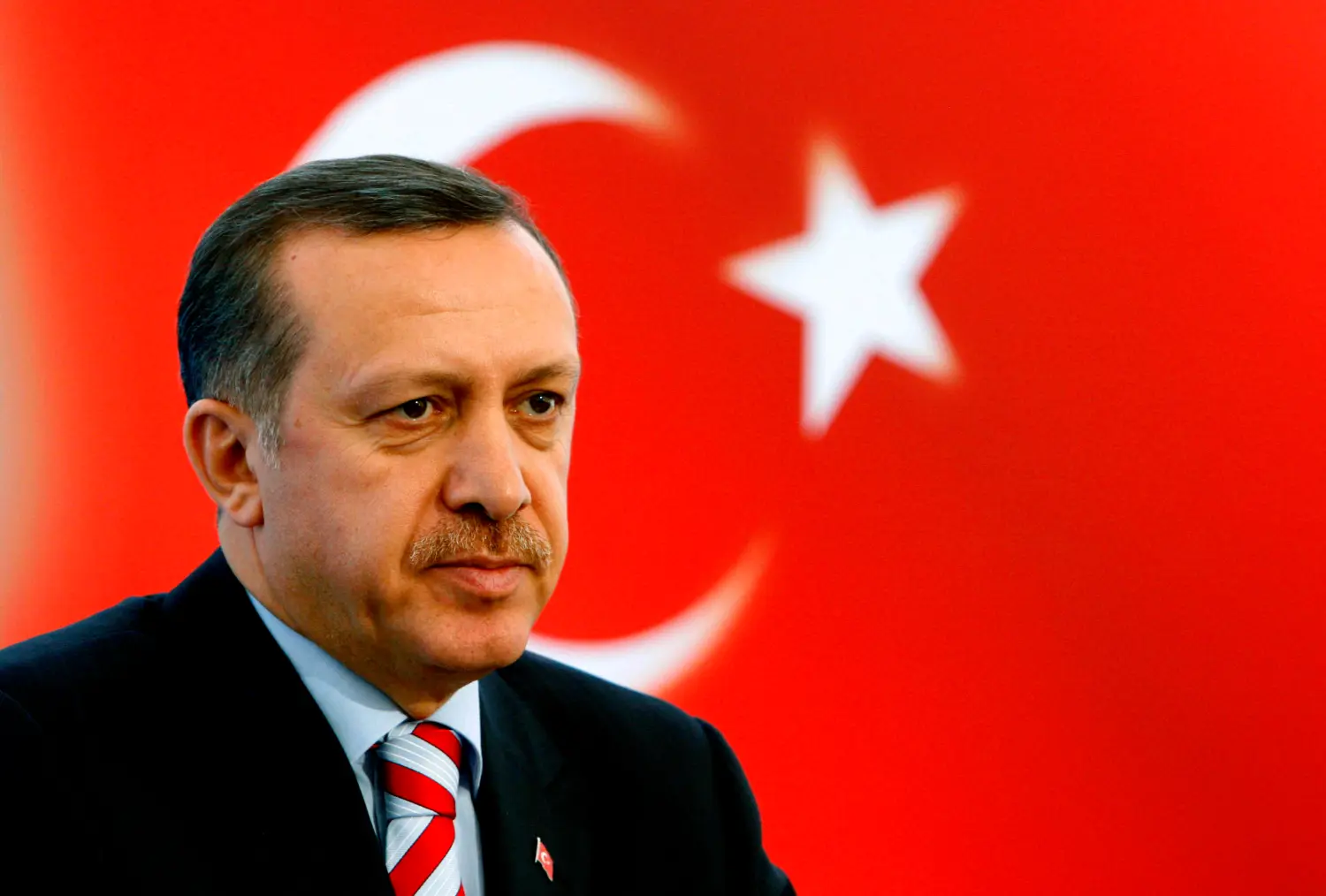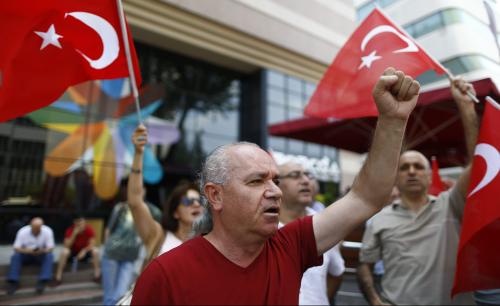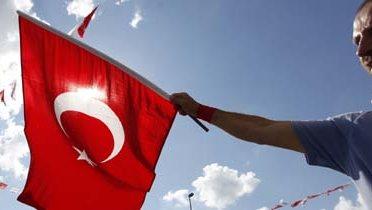Erdoğan’s steamrolling of both internal and external opposition raises a set of intriguing, if difficult, questions about the role of great men in politics, writes Shadi Hamid. How much can one man matter in a nation with rich history and traditions and (relatively) strong institutions? This essay originally appeared in The Atlantic.
Politicians—especially ideological ones—have to eventually deal with the “then what?” question. With Turkish President Recep Tayyip Erdoğan’s narrow victory in a tense April referendum granting him sweeping new powers (amid opposition allegations of voter fraud), he could very well dominate the country’s politics through 2029. He would have more than a decade to reshape Turkey, altering the very meaning of what it means to be Turkish.
In the first decade of its rule, beginning in 2002, Erdoğan’s Islamist-rooted Justice and Development Party (AKP) presided over a rapidly growing economy, pushed through liberal reforms, and sidelined a military that had undermined Turkish democracy in a series of coups over the course of six decades. Could that, though, really have been all the AKP and its fiery, erratic leader hoped to accomplish?
In a sense, the AKP became a victim of its own success. It could have expanded freedoms and democracy and continued to boost the economy, to diminishing returns. Presumably, Erdoğan, a man who saw himself in historical terms, wanted to be remembered not just for improving Turkey, but for transforming it. Being a good, even the best, technocrat could never be enough. Erdoğan’s vision had little room for other individuals of stature, a fact that once again became evident during the power struggle with and subsequent fall of Prime Minister Ahmet Davutoğlu, himself a longtime AKP figure and the architect of the party’s foreign policy.
Erdoğan’s steamrolling of both internal and external opposition raises a set of intriguing, if difficult, questions about the role of great men in politics. How much can one man matter in a nation with rich history and traditions and (relatively) strong institutions? Political scientists have long been uncomfortable attributing too much importance to individuals, since this would complicate the quest for causal conclusions and the ability to draw generalizations across cases. Put more simply, it’s quite difficult to “model” the role of individuals.
How much can one man matter in a nation with rich history and traditions and (relatively) strong institutions?
In an important 2001 article, subtitled “bringing the statesman back in,” my colleagues Dan Byman and Ken Pollack argue for “rescuing men and women, as individuals, from the oblivion to which political scientists have consigned them.” The challenge is identifying when individuals matter more than they might otherwise. One such context is when institutions are weaker and therefore less constraining. Of course, one reason institutions may be weaker in the first place is because power-hungry leaders insist on ignoring, challenging, or even dismantling them. In such circumstances, ambitious leaders may be doubly influential. “An exceptionally charismatic leader can overcome even strong institutions,” write Byman and Pollack, which is precisely what Erdoğan was able to do in his battle with a once dominant “deep state,” a shadowy configuration of powerful networks, namely in the military, judiciary, and security services.
* * *
The successes had clearly gotten to the president (something that became all too clear when I made my way into the decadent “White Palace” in 2015 shortly after it had opened to considerable controversy). Increasingly, Erdoğan portrayed himself as a statesman on par with Mustafa Kemal Ataturk, the founder of modern Turkey, who had abolished the Ottoman caliphate—the last caliphate—in 1924. In March 2014, Erdoğan released a video suggesting he was leading Turkey’s “second war of independence,” shortly after an AKP press release referred to him as the “builder of Turkey.”
In writing about the Turkish “model” for my recent book Islamic Exceptionalism, I was interested in two questions. First, how much did Erdoğan matter as an individual? And, relatedly, to what extent was Erdoğan motivated by religious concerns? It is difficult to imagine, say, the former president Abdullah Gul, a co-founder of the AKP, being as divisive and polarizing as Erdoğan. Gul had long been discussed as a potential, and more agreeable, challenger to Erdoğan. What if Gul, a mild mannered economics professor, had become the leader of the AKP? As one of his former advisers told me, “[Gul] hates populist discourse. He’s also a pragmatist. He’ll look at something and say, there’s no possibility of me doing it, so why should I take the risk? And he wants people to be more religious, so he worries that divisive rhetoric undermines the cause.” At the same time, though, Gul, pragmatist that he was, would have come to realize that religious and social conservatism were good ways to rally the base in a country where the primary cleavages had to do with identity, ideology, and religion. Perhaps he would have found a way to be nicer about it. He almost certainly, though, wouldn’t have been as successful.
Just as religious conservatism may have made sense electorally, it certainly made sense personally. There is little doubt in my mind that Erdoğan very much believes that Turks should be more religious. A former senior advisor to AKP officials pointed to the death of Erdoğan’s mother in October 2011 as a critical moment. “Erdoğan was like a small kid when he was with her,” he told me. “After she died, he began to think more about death.” Implicit, here, is the notion that any Islamic leader will have to face God on the Day of Judgment, and God will presumably ask him how he dispensed his responsibilities. Also, presumably, God would be concerned not just about Turks but also about the ummah, the global Muslim community, more generally. As a famous hadith of the Prophet Mohammed—one Muslims hold to be strongly authentic—goes: “Surely! Every one of you is a shepherd, and every one of you will be asked [by God] how he tended to his flock. The imam (leader) of the people is a shepherd and will be questioned [on the Day of Judgment] regarding his flock.” If Erdoğan is a shepherd, Turks are his flock, and the state is his staff.
Erdoğan has shown a keen interest in using state power to incentivize, rather than impose, piety—in other words, not the direct implementation of Islamic law that observers often associate with Islamism, but rather a kind of “soft Islamization.” Instead of banning alcohol, which would be impossible in Turkey (and perhaps even unconstitutional if done for explicitly religious reasons), the AKP raised taxes on alcohol and prohibited the sale of liquor after 10 p.m. The AKP also moved to provide financial stipends to young couples that married early. Couples who had more than three children would qualify for financial support. The party wouldn’t go so far as to draft new legislation restricting abortion, but abortion was clearly something that bothered the party’s de facto leader. As Erdoğan once said: “There is no difference in killing the fetus in a mother’s womb or killing a person after birth.” Erdoğan, acting in his “spiritual leader” mode, was sharing his own views about the virtuous life. As one senior AKP official put it to me: “Erdoğan at times behaves like a father. Not everything that he says is a law. It is a suggestion. It is also to protect young people from bad things.”
[T]his kind of ad hoc and rather personalized Islamism also demonstrated the limits of modern Islamist movements.
But this kind of ad hoc and rather personalized Islamism also demonstrated the limits of modern Islamist movements. When Ismail Kahraman, a fellow AKP politician and speaker of parliament, ignited controversy in April 2016 by suggesting that the “irrevocable principles” enshrining secularism be removed from the constitution, Erdoğan distanced himself from the remarks. Yet what Kahraman was suggesting would have been fairly innocuous anywhere else. Constitutions in the Middle East do not generally enshrine secularism, and it was only normal that a party with Islamist roots would want more neutral constitutional language (the United States constitution, for instance, includes no mention of the word “secularism” and does not, like the Turkish constitution, restrict religious expressions in public life).
Erdoğan had a vision for society, but it wasn’t particularly well-formed. The AKP itself didn’t have many able theoreticians, to say nothing of actual scholars of Islam or Islamic law. Turkey’s Islamists, then, had ideas, but they seemed incapable of expressing them in a coherent fashion. One notable exception to this was perhaps Ibrahim Kalin, chief adviser to Erdoğan and sometimes described as the president’s right-hand man. Previously a professor of Islamic philosophy at Georgetown University in Washington, D.C., and the author of an intellectual biography of the Shiite philosopher Mulla Sadra, he was bookish and self-deprecating when I sat down with him in 2015 at the White Palace; he seemed to be in dialogue not just with me but also with himself, occasionally losing himself in thought as he discussed pre-modern Islamic philosophy. Kalin had a deep respect for Erdoğan, a man he had served loyally for so long, but I also sensed a certain resignation, that he could only influence Erdoğan up to a point. Ultimately, the policy was “let Erdoğan be Erdoğan.” (Like so many intellectuals compelled into politics, I could imagine Kalin living a much happier life as a professor.)
President Erdoğan was his own man, formed by his own experiences, and these experiences were instinctual rather than intellectual. If they had been intellectual, then perhaps the idea of using the Diyanet, the Turkish state’s religious ministry, to promote Islamization—when it was previously used by Ataturk for quite the opposite—might have seemed at least mildly problematic. Under the AKP, the Diyanet, which trains imams, administers mosques and religious schools, and oversees Friday sermons, doubled its staff, with its annual budget increasing more than fourfold. Though recognized religious minorities can apply for exemptions, religion classes have been made compulsory for children in public schools. In a 2015 speech, Erdoğan boasted that enrollment in imam hatip schools (state-run religious high schools) had skyrocketed from 65,000 students to nearly 1 million—a striking shift that will reshape how young Turks understand their religion and heritage.
Technical indicators, such as perpetually increasing GDP per capita, couldn’t encompass the vision of what Erdoğan termed “New Turkey.” The term became ubiquitous in 2014 among AKP loyalists. As the pro-Erdoğan Yeni Safak put it: “New Turkey is not a slogan. … New Turkey is a project. This is the redesigning and re-establishing of Turkey after a century.” Islamists often use the word “project” to convey the idea of a slow, bottom-up transformation of society.
With such a long-term project in mind, it is probably no accident that the AKP hopes (plans?) to govern Turkey until 2071, a year that marks an important, although not entirely well-known, thousand-year anniversary. In 1071, the Seljuk Empire entered what is today Turkey, after defeating the Byzantine armies in the Battle of Manzikert. The year 2071 might seem rather distant, but, in some ways, staying in power until 2071 is a relatively modest endeavor. In an August 2014 speech, Prime Minister Davutoğlu noted that the AKP “began as the movement of a generation, but it is not limited to a generation. It is not even limited with generations and centuries. It is the name of a struggle for justice and right that originates from the depths of centuries and which will continue until the end of times.”
Samuel Huntington, in his much-pilloried The Clash of Civilizations, described Turkey as the quintessential “torn country”—and one that could perhaps become untorn by becoming the central “core state” at the helm of the Muslim world, rather than a doting, awkward member of the West. To do so, Huntington argued that Turkey “would have to reject Ataturk’s legacy more thoroughly than Russia has rejected Lenin’s. It would also take a leader of Ataturk’s caliber and one who combined religious and political legitimacy to remake Turkey from a torn country into a core state.” Huntington wrote these words in 1996, when Erdoğan was a young mayor of Istanbul who few outside of Turkey had ever heard of.
* * *

The case of Turkey is a cautionary tale, a kind of microcosm of a Middle Eastern spring that could have—or should have—turned out differently. Outside of Islamists of various stripes, few mention the “Turkish model” anymore, at least not without knowing irony or to highlight the country’s descent into political conflict and its ceaseless attacks on press freedom (the more self-aware Islamist parties, such as Tunisia’s Ennahda, no longer cite Turkey nearly as much as they once did). As the Turkish journalist Mustafa Akyol wrote in 2016: “About five years ago, everyone was talking about the ‘Turkish model.’… These days, I think back on those times with nostalgia and regret.”
Turkish Islamists don’t seem to care much. Their struggle—for now focused within—takes precedence over everything else. The payoff, in terms of legacy and history, might not come until 2029, 2071, or perhaps in the afterlife. No matter. As a senior adviser to Davutoğlu put it to me: “Secularists live with Ataturk’s corpse. … We need to carry Mr. Ataturk to his grave again.” I remember giving him a quizzical look, but he didn’t care how it sounded. This, for him, had become a matter of faith. (I’m not sure if he realized it, but on the television screen behind him, Erdoğan was giving a rousing speech, as usual without notes, a reminder that no matter where I went in Turkey, the president seemed to be watching us.)
Decades before, Ataturk had altered the very basis of what it meant to be a “Turk.” To transform Turkey in his own image, he would need to be unforgiving and relentless. It required the centralization of power and a narrow-minded, overarching purpose, since most Turks didn’t share Ataturk’s secularizing vision, at least not at first. In this sense, the demands of statebuilding, requiring the accumulation of authority, and the demands of democratization, requiring the balancing and distribution of power, were in conflict. Now, nearly a century later, the state was still the prize. Erdoğan wanted to capture it, using Ataturk’s model of state-centered social engineering to undo what had been done long before he had been born. For the rest of the world, this was authoritarianism. For Erdoğan, it was justice, returning Turks to their natural state of religiosity before Ataturk had changed them from what they were and always had been.
How else would the devout Erdoğan, an Islamist, interpret the coup, except as part of some divine plan?
The AKP’s conservative base had been patient throughout the 2000s, as the party focused on promoting democratic reforms and propelling a new pious middle class, which was benefitting handsomely from AKP-led economic growth. AKP leaders told them to be patient, that long-awaited changes like removing the headscarf ban in public institutions and universities would come in due time. They couldn’t risk a premature confrontation with the state over such a notoriously sensitive issue, one that would challenge the uncompromising secularism of a Turkish state that they didn’t yet fully control.
Erdoğan, then, was not about to question the basic structures of the modern state, and why should he? A too-powerful state was all he knew, having been on its receiving end for so long (including a stint in prison for reciting a religious poem). He had a distinctive vision for Turkish society, based on resuscitating Turkey’s Ottoman past and returning to the fitra, or “innate disposition,” of Islam. Just as the Kemalist state had created an image of the ideal Turkish man, the state under Erdoğan’s leadership wished to create its own (very different) ideal of the pious Turk. This was Erdoğan’s “reverse Ataturk.”
* * *
On July 15, 2016, Turkey experienced its latest coup attempt, catching even seasoned Turkey watchers by surprise. Based on his mathematical model, political scientist Jay Ulfelder had put the probability of a Turkish coup attempt in 2016 at a mere 2.5 percent. The attempted coup was, in a sense, a godsend, as Erdoğan himself immediately understood: He called the coup (after it failed) a “gift from God.” Some observers found this to be an odd turn of phrase, suggesting that a broader false-flag conspiracy was afoot. The correct interpretation was probably the simplest: Erdoğan quite literally believed it was a gift from God. The coup plotters had come close to killing him, firing on the very hotel he was staying in just after he fled, but this only made the message more potent. How else would the devout Erdoğan, an Islamist, interpret the coup, except as part of some divine plan?
There has been some confusion regarding Erdoğan’s mortality. He clarified the matter in his first interview after the April referendum handed him a slim victory, stating “I am a mortal really.” He also said, “I could die at any time,” and it is this seemingly pedestrian remark that offers greater insight into his thinking. Erdoğan sees himself as both mortal and as the founder of Turkey’s Second Republic, an ambition he still needs to secure. The religious and political imagery of Erdoğan’s first acts after the referendum largely escaped Western notice, but they were full of symbolism for those who understood the symbols. With Ibrahim Kalin and other important figures by his side, he rushed to visit the grave of Abu Ayyub al-Ansari, a companion of the Prophet Mohammed who took part in the first Muslim siege of Constantinople and was buried at the walls of the city. When the city fell to the Ottomans some eight centuries later, Ansari’s tomb became Istanbul’s holiest site, where new sultans were officially coronated. Erdoğan also visited the tomb of Selim I, the caliph who famously consolidated control over the holy cities of Mecca and Medina.
Erdoğan found time, too, for more recently fallen political saints, visiting the graves of former prime ministers Adnan Menderes and Necmettin Erbakan. Erbakan, the Middle East’s first democratically elected Islamist head of government, was forced out of power in 1997’s “soft coup.” Menderes was the country’s first democratically elected prime minister and loosened restrictions on Islamic observance. He was hung after Turkey’s first military coup in 1960. Erdoğan treats Menderes’s execution as his political coming-of-age, recounting how he and his father cried that day, even though he was only seven at the time. Erdoğan sees himself as taking Menderes’s project to its logical conclusion—consolidating Turkey’s Islamic present and its Islamic future. But Erdoğan is well aware that he may not live to see his vision—really his dream—realized. (Erdoğan fears he might be poisoned, and all of his food is tested, with the help of five lab experts, in the White Palace.)
If Erdoğan knows he will not live forever, then securing a presidential system as he did through the April referendum may be the best way to guarantee his legacy. With the creation of a popularly elected executive presidency (before 2014, the president was voted in by parliament), religious Turks will always have to be catered to, no matter who is running for office. In short, save another military coup or some other black-swan event, Turkey’s president—likely from the AKP for the foreseeable future—will need to accept, and perhaps even embrace, Turkey’s religious heritage. Ataturk may, in fact, be carried to his grave after all. International opprobrium and the dimming of the Turkish “model”—at least for Erdoğan—is a small price to pay.








